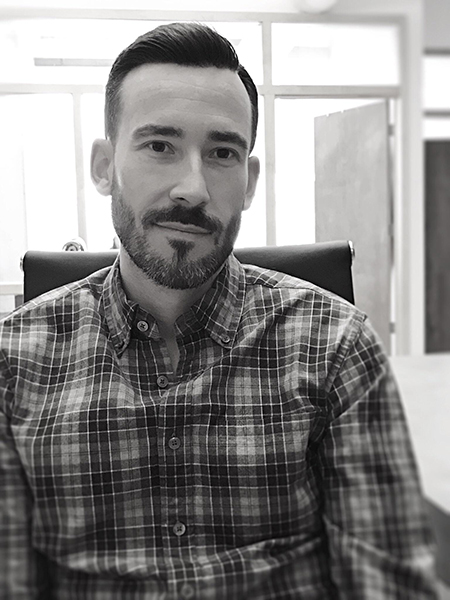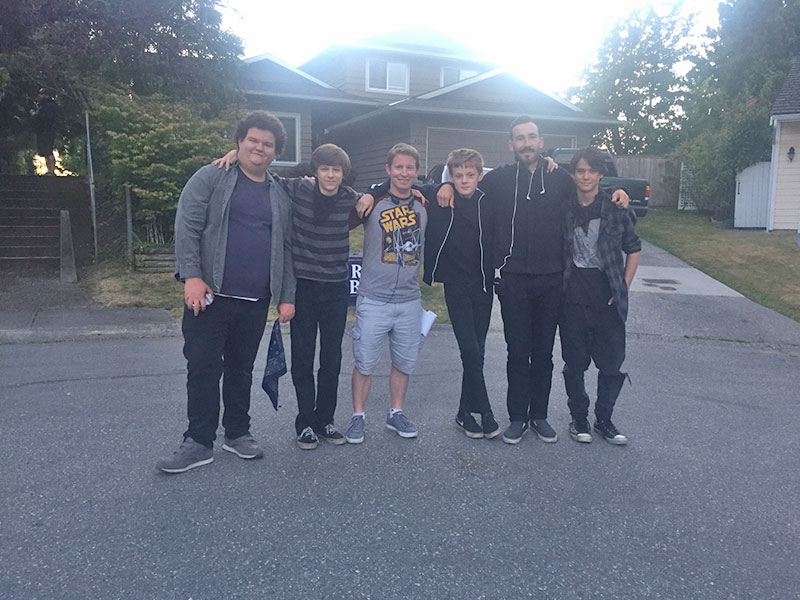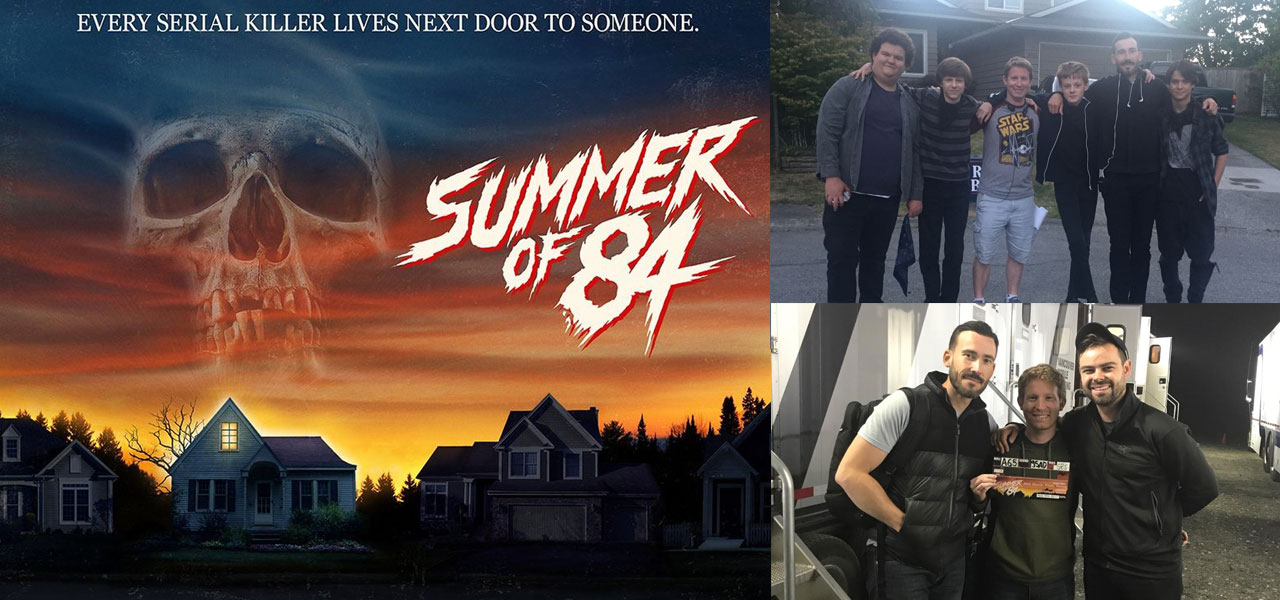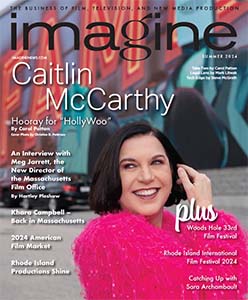Q&A with Matt Leslie, writer of the Sundance film, SUMMER OF 84
By Carl Hansen
Carl Hansen (CH): WHERE ARE YOU FROM ORIGINALLY AND HOW LONG HAVE YOU LIVED IN LOS ANGELES?
Matt Leslie (ML): I’m originally from Ipswich, MA, and I’ve lived in LA since 2004 (with the exception of a two year move to NYC). I actually came out west following a girl — my then Fiancée (now wife) got a job in LA so that was that.

Matt Leslie
CH: WHAT ATTRACTED YOU TO THE CRAFT OF WRITING AND WHAT KEEPS YOU WRITING?
ML: Back in middle school and high school, my teachers would always tell me I was a strong writer, but I didn’t take it seriously because I had no idea what I wanted to do with my life. In college, I got my BS in Communications with a focus in Advertising, which was a degree that was super broad and allowed me to use my writing ability in the future professionally. Somehow. But that “somehow” eluded me. Then, as I mentioned, I fortuitously wound up in LA and there was the movie business. Something that always seemed so far away and impossible to be a part of was suddenly a possibility. As a movie lover, I started reading every book on screenwriting craft I could find. Then I started writing scripts, and here we are…
As for what keeps me writing, there are two things:
1) I love writing movies. It’s a blast and I’ll do it ’til the day I die if I can. And…
2) My writing partner. His name is Stephen J. Smith and we hold each other accountable. Which is rarely necessary, but on the off chance I’m not feeling it (or vice versa), that ticking clock keeps us writing, pushing each other to be productive.
Steve’s a ridiculously prolific writer. While we were writing scripts years ago, little did I know he was also writing what would become a 500+ page novel called THE SABRAEL CONFESSION. Guy’s a G!
CH: WHAT MOVIES/TV SHOWS/CONTENT INSPIRE YOU? WHAT GENRES DO YOU PREFER WRITING?
ML: This is a tough question because what inspires me evolves constantly. I do have that list of classic flicks I grew up with that I love and could watch all day every day (e.g. THE GOONIES, THE BURBS, GROUNDHOG DAY, THE SHINING, THE THING, THE OMEN, and on and on and on…), but when it comes to new movies that inspire me, it’s all over the place. I haven’t been watching as much TV as I’d like because I’ve been writing so much, but a goal I have for 2018 is to make more time for it.
As for what I love writing, it’s less about genre and more about concept. If you tell me a logline and my mind explodes with plot and character, I’m in. That said, many high concept ideas come from the thriller/horror space and that’s the sandbox we’re playing in these days. We’ve had some success there, we’re having a blast and it’s creating momentum. Maybe one day down the line we’ll branch out and dabble in other genres, but for now, that’s where we are.
CH: HOW LONG HAVE YOU AND YOUR WRITING PARTNER, STEPHEN J. SMITH, BEEN WORKING TOGETHER, HOW DID YOU MEET, AND WHAT MAKES THE PARTNERSHIP SUCCESSFUL? HOW MANY SCRIPTS HAVE YOU WORKED ON TOGETHER?
ML: I met Steve at a tiny writers group in Silverlake about 10 years ago. We were the consistent members in a revolving door of writers and we grew to recognize each other as being more insightful, imaginative and dedicated than the others in the group. Then we wound up bumping into each other at a couple other writing events, like the Screenwriting Expo in LA (is that still a thing?) and the two year Writers Bootcamp program in Santa Monica.
Shortly after that, the 2008 WGA strike and economic collapse happened and the freelance copywriting gigs Steve had been working at the studios dried up. He had to move back to where he’s from in Wisconsin for a copywriting gig he landed at Kohl’s Department Stores’ corporate office. Oddly enough, that’s when we decided to try writing together…
Steve found this now-defunct screenwriting competition called “The Script-a-thon.” The idea was to write a feature length script in thirty days and see if your script wins the competition. Way we saw it, it put our feet to the fire so we had to produce something, plus we’d see if we work well together. Long story short, we wrote a high concept comedy script called ABANDON SHIP! And we won the grand prize. Granted, it was no Nichol Fellowship but there were over one thousand entries so we felt pretty emboldened. Plus, we had a blast. That was seven years ago now. Since then, we’ve written eight feature screenplays, one TV pilot and countless treatments/pitches.
If I had to pinpoint why we have a successful dynamic, I’d say it’s because we both have zero ego when it comes to ideas. The best idea always wins with us, regardless of who comes up with it.

Matt & Stephen with the cast of SUMMER OF 84. From left to right: Caleb Emery, Graham Verchere, Stephen Smith, Cory Gruter-Andrew, Matt Leslie and Judah Lewis
CH: WHAT’S YOUR PROCESS FOR WRITING WITH A PARTNER? (IS ONE OF YOU IN FRONT OF THE KEYBOARD OR DO YOU TAKE TURNS WITH DRAFTS, ETC.?)
ML: Because Steve’s in Wisconsin and I’m in LA, we’ve become pros at collaborating remotely. We break screenplays into 12 sequences — Act 1 is 3 sequences, Act 2 is 6 and Act 3 is 3, each sequence running somewhere between 8 and 12 pages. So we’ll hop on marathon phone calls during the outlining process, nailing down every beat throughout all 12 sequences, because when you’re collaborating with someone, you have to have your roadmap fully fleshed out or when you each write your respective sequences, they won’t match up when you combine them. We use Google Docs to outline because it allows real-time collaboration. Then, once our 12-sequence outline is done (which is usually 20-30 pages long and often includes some dialogue), we’ll go off and write our assigned sequences. On the first pass, I always take the odd sequences and Steve takes the evens. Then, once we’re done writing the 6 sequences we’re each responsible for, we switch — I rewrite his sequences and he rewrites mine. At that point, it’s back to marathon calls, walking through the entire script, talking out problems, fine-tuning dialogue, narrative prose, etc.
Also, we use an awesome screenwriting app called Writer Duet, because unlike Final Draft it allows real-time collaboration like Google Docs, but in screenplay format. It’s a super robust program with everything you need from first draft all the way through production. We used it for all revisions on our film SUMMER OF ’84 and it worked flawlessly. Also, their customer service is unreal. The dude who created the app is the one who responds to you and he is on the ball. Couldn’t recommend it highly enough. And no I wasn’t paid for this plug 😉
CH: WHERE DID THE IDEA FOR “SUMMER OF ’84” COME FROM? ANY REAL WORLD STORIES OF NIGHTMARE (OR SERIAL KILLER) NEIGHBORS?
ML: I grew up on this sleepy, suburban dead-end street in Ipswich, MA and I had some…… “Interesting” neighbors for sure, though nothing and no one scary or dangerous. Just more weird and mysterious. I’d walk up the same street every day after the school bus dropped me off, and there were certain people who lived on the street I’d always see. But then there were certain people who I don’t think I ever saw and my mind would explode with theories about those people. Who were these people? What did they do with their lives that I never saw them? Were they in the CIA? Were they serial killers? Like I said, sleepy town. Ha.
That said, back in like 1986, there were a string of home robberies that occurred on our street that really sent a chill through the community. No joke, that was when people started locking their doors. Crazy to me there was a time people didn’t lock their doors, but I guess the ’80s marked the end of that era in the ‘burbs. At least, it did in my neighborhood…
The characters in SUMMER OF ’84 are really an amalgamation of various friends, neighbors and events Steve and I experienced growing up, but I suspect our experience is what most kids experience living in suburbia. It’s a little boring, a little provincial, but every once in a while, something insane happens that snaps you back to the reality that bad things can happen there too. That’s basically the idea SUMMER OF ’84 taps into.
CH: HOW LONG DID IT TAKE YOU TO WRITE AND HOW MANY DRAFTS DID IT GO THROUGH BEFORE IT WAS PUT INTO PRODUCTION?
ML: SUMMER OF ’84 took us like three months to write, from idea through finished draft. When Gunpowder & Sky (the studio that financed the film) came on board, we did one rewrite to tighten the script and heighten some of the moments in the first half of Act 2 so that the momentum didn’t lag. They were great notes that got us from a 112 page script with pretty good pacing to a 104 page script that flew. But that was it, one rewrite.
Once we were in pre-production and production, we had to continue to adjust certain things due to locations changing and certain elements not clearing legal. For example, we had a kid wearing an Atari shirt in the draft that was green lit, but during pre-production, Atari said we couldn’t use their logo so it had to change. At the time, we were pretty devastated, but Van Toffler, the founder and CEO of Gunpowder & Sky, was previously the MTV Chief, so he worked his magic and scored us the MTV logo. Talk about a baller move. Sick. Love that guy.
Another example, this time of a location change, was that we had a setpiece at a roller rink. Only thing is, there are no roller rinks still in operation in Vancouver, BC where we shot. So that sequence had to change to a bowling alley and necessarily had to be overhauled because of it. Stuff like that…
CH: WHAT WAS IT LIKE BEING A WRITER AND ALSO A PRODUCER ON THE PROJECT? WAS THERE EVER AN INSTANCE WHERE SOMETHING IN THE SCRIPT WASN’T ABLE TO BE DONE DUE TO PRODUCTION CONCERNS OR SOMETHING THAT HAD TO CHANGE FROM WHAT WAS INITIALLY WRITTEN?
Being a writer-producer was awesome. Because had I just been the writer, I wouldn’t have been on set. So often in Hollywood, when it comes to features, the screenwriter isn’t involved once that final draft is handed in. But I wanted that experience. In TV right now, writers are the gods of the worlds they create and are empowered by networks accordingly. And look, TV is having a Renaissance. Film could be having a similar boom if writers were more empowered, but I digress…
To get that producer credit, I had to earn it. After writing the script, I attached the directors, a trio called Roadkill Superstar (RKSS). Since they’re Canadian, I thought it’d be attractive to potential financiers if I also attached a production services company in Canada that could not only crew us up, but also help us take advantage of Canadian tax incentives. I found a great company called Brightlight Pictures in Vancouver and they hopped on board. At that point, we needed a financier. My manager Jeff Portnoy at Bellevue Entertainment got me a meeting with Cody Zwieg at Supergravity Films, and while Cody loved the package, they couldn’t finance us at the budget we were looking for, so it didn’t go anywhere at the time. A few months later, I bumped into Cody at an industry holiday mixer and he informed me that Supergravity was being acquired by Gunpowder & Sky, a company that could finance our film at the budget we wanted, and that he wanted to help me get it done. By May of 2016, we had a green light.
As one of two producers on set (the other being Jameson Parker at Brightlight Pictures), I learned a ton. Every day on set is a massive learning experience because filmmaking is basically highly organized chaos. You’re thrown into the fire and you just figure stuff out because you have to. Our budget was honestly the exact right amount for this film, but it was still really tight on all of our 23 days of shooting. There were many times we wanted to get a certain shot and couldn’t afford it, or wished we had just a few more hours in a location but couldn’t afford it. Thankfully we had an awesome cast and crew and a supportive studio in Gunpowder & Sky, so we were able to overcome everything thrown at us and make a film I’m extremely proud of.
CH: HOW CLOSE IS THE FINISHED FILM TO THE SCRIPT THAT WAS WRITTEN?
ML: It’s really almost exact. There are a few improvised lines from our actors, but all in all, what you read is what you see. Again, during pre-production and production, some things had to change due to location changes and constraints and clearance issues, but none of that hurt the DNA of the film. We’d occasionally have to change dialogue on the fly if we all felt something wasn’t landing, but again, it was rare. And our directors and their talented DP Jean Philippe Bernier, translated the script to the screen beautifully.
CH: WHERE WERE YOU WHEN YOU HEARD THAT “SUMMER OF ’84” WAS ACCEPTED INTO SUNDANCE (I ASSUME IT WAS ON NOVEMBER 29TH)? WHAT WAS THAT MOMENT LIKE FOR YOU?
ML: Yup, November 29th. I was on my couch writing emails when I got an email from Cody Zwieg at Gunpowder & Sky. At first, because it wasn’t a phone call, when I saw the subject line “Sundance,” my heart sank and I assumed it was a rejection email. Nope… Turns out Cody just couldn’t call so he forwarded the email as soon as he could so we’d all see that we got in. Crazy. Still doesn’t feel real. The film premiered at the Library Theater in Park City at midnight on January 22, 2018 to a packed house. It was a surreal moment that I’ll never forget.
CH: WHAT’S NEXT?
ML: We have a feature script called THE HARROWING at a company called Cinelou (THE COMEDIAN, MR. CHURCH, and CAKE). It’s a supernatural thriller in the vein of ROSEMARY’S BABY but with a big plot twist at the end that’s gonna seriously shock audiences. In a good way. Can’t wait for that one to be on the big screen. Fingers crossed that gets green lit in 2018/19.
Beyond that, Steve and I have a lot of irons on the fire. We’re currently out with a TV pilot we’re hoping finds a home, and we have a feature that we’re gonna be writing on spec starting soon. We’re also attached to write a sci-fi-suspense digital series for Skybound (THE WALKING DEAD) that’s an offshoot of a really awesome videogame called OXENFREE (if you’re a gamer and you haven’t played it yet, you should). Plus we’re up for a number of other projects that we hope to come aboard. Again, fingers crossed… which is something I find myself saying alot these days.
CH: LOOKING BACK, WHAT ADVICE WOULD YOU GIVE YOURSELF AT THE OUTSET OF YOUR WRITING CAREER/WHAT ADVICE WOULD YOU GIVE TO A WRITER STARTING OUT?
ML: My biggest advice to writers is get into the entertainment industry. Be a PA on a movie set, be an assistant to a director or a producer (which is what I did — I worked for two producers as an assistant and then as a development exec and it opened lots of doors for me) and meet people in the business. Like everything in life, it’s all about who you know. There’s no place that’s MORE true than in Hollywood.
If I didn’t work in the business, I wouldn’t have met the directors of SUMMER OF ’84, which means that film wouldn’t have been made. Period. Because they were a big piece of the package that excited Gunpowder & Sky. These days, you usually need more than just a script, and I don’t know how you can manage that without relationships in the business.
For my first few years writing, having never been in the business at that point, I naively thought I’d write a script that wins a screenwriting competition, get representation that way, and be on the path to raking in serious dough as a screenwriter. Yeah, no. The odds of those stars aligning are beyond small. You’ve gotta get out here and MAKE it happen. Otherwise, I don’t care how talented you are, the odds are way stacked against you.
It’s a harsh reality to face when you live elsewhere while working a day job to get by and this is your dream. But it’s the truth.
CH: WHAT WAS THE RECEPTION OF THE FILM LIKE AT SUNDANCE AND SINCE? WHAT WAS THE EXPERIENCE LIKE OF HAVING A FILM IN THE FESTIVAL?
The film was warmly received at Sundance, which was really awesome for Steve and me. Everyone who works at Sundance, from the Programmers all the way down the line, were amazing, helpful, encouraging, and really just everything you could hope for.
There weren’t many film sales right out of the gate at this year’s Sundance, and we were no exception. Netflix and Amazon not buying left a pretty big void, but Gunpowder & Sky believed in our film, so they’re distributing the film themselves. We feel super fortunate to have them as partners in this process.
At the end of the day, all you want is for people to enjoy your movie and have fun for two hours, and it seems like we’re succeeding in that regard. Audience reaction on Twitter, etc. has been almost exclusively positive, which is really heartening.
CH: WHEN DOES “SUMMER OF ’84” COME OUT AND HOW CAN WE SEE IT?
The film comes out in select theaters on August 10th, and then it’ll be on VOD on August 24th. I have to say, it’s been pretty awesome to see the countless messages on Twitter, Facebook and Instagram from fans asking when they’ll finally be able to see it. The wait is almost over, and we cannot wait for the world to finally see SUMMER OF 84.
Beverly native Carl Hansen has written for IMAGINE since its inception. He is our reporter at large and he is an award-winning filmmaker and Emmy-winning producer who has been involved in various capacities with many successful unscripted and variety series. He won a Sports Emmy award for his involvement in “100,000 Cameras: Ohio State at Michigan” (Fox Sports) and was previously nominated for “89 Blocks” (FOX Sports). As a Co-Executive Producer he was nominated for a Primetime Emmy for “Shark Tank” (ABC). He was Supervising Producer on the critically-lauded and award-winning docu-series “Boston Med” (ABC News) where he was instrumental in coverage of the 2nd partial-face transplant in the U.S. and which led to many people signing up as organ donors for the first time. He is currently the director of production for Fox Sports Films. His credits are too numerous to mention.
Originally from Beverly, Massachusetts, Carl is a graduate of Beverly High School and Ithaca College. He currently resides in Los Angeles with his wife and son.
Read more about Matt’s use of local North Shore locations in the film here.




